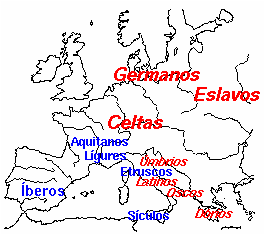2.1. The Pre-Romanic period
Linguists today have good reason to believe that a large number of
languages from Europe and Asia originate from the same source,
designated by the term Indo-European. With the exception of
Basque, all of the official languages of Western Europe belong to one
of four branches of the Indo-European family. These are: the Hellenic
(Greek); the Romanic (Portuguese, Italian, French, Castilian or
Spanish, etc.); the Germanic (English, German); and the Celtic (Irish,
Gaelic). Most of the various languages spoken in Eastern Europe form
part of a fifth branch, the Slavic one, of the Indo-European
family.
Some time around the second millennium BC, the large east to west
migration of people speaking languages from the Indo-European family
that was taking place came to an end. They reached their almost
definitive habitat at this time and proceeded to make permanent
contact with the people that they encountered who were of diverse
origins and spoke non-Indo-European languages. One such important
Indo-European migratory group, the Celts, settled in Central Europe,
in the regions of Bohemia and Bavaria in the modern day Czech Republic
and Germany respectively.

|
Some languages of Europe in the second millennium BC
People of Indo-European origin:
Germanics, Slavs, Celts, Umbrians, Latins, Oscans,
Dorians.
People of non-Indo-European origin:
Iberians, Acquitanians, Lugurians, Etruscans, Siculians.
|
The Celts were situated initially in the centre of Europe, but
between the second and first millennium BC, they had spread across
other regions so that by the third century BC, they had occupied more
than half of continental Europe. The Celts go by different names
according to the regions in which they settled, so that they are known
as the Celt-Iberians in the Iberian Peninsula, the Gauls in France,
the Bretons in Great Britain and the Galatians in the centre of
Turkey.
Yet owing to the external pressure that they faced, principally from
the Romans, the Celtic expansion ceased and the territory that they
inhabited shrunk considerably. The Celtic languages, pushed to the
western extremities of Europe over the course of several centuries,
nonetheless still manages to survive in certain regions of Ireland
(Irish is one of its official languages), Great Britain and Brittany
in France. Surprisingly though, not a single Celtic language survived
in the Iberian Peninsula, where the Celts first established themselves
as far back as the first millennium BC, and where the language was
still being spoken up until the seventh century AD in Galicia (a
region in the north of Portugal and currently a part of Spain.)
|



